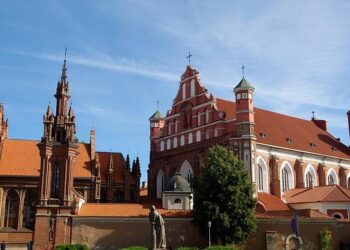Lithuania has steadily emerged as a proactive partner in the global development arena, carving out a distinct profile within the Organisation for Economic Co-operation and Development (OECD). As the country continues to expand its international development efforts, its evolving strategies and areas of focus provide valuable insights into its role on the world stage. This article delves into Lithuania’s development co-operation profile as outlined by the OECD, examining key priorities, financial commitments, and the impact of its aid programs.
Lithuania’s Emerging Role in Global Development Co-operation
Over the past decade, Lithuania has rapidly positioned itself as a noteworthy contributor within the international development community. Although its financial contributions may not yet rival the largest donors, Lithuania’s strategic focus on collaboration, knowledge-sharing, and targeted aid has garnered global recognition. The nation’s development cooperation initiatives concentrate on fostering sustainable growth, poverty alleviation, and governance reform in partner countries, primarily across Eastern Europe, the Western Balkans, and select African nations. Key areas of support include public administration reform, democratic institution building, and civil society empowerment, reflecting Lithuania’s commitment to stability and inclusive development beyond its regional borders.
Lithuania’s unique approach blends direct bilateral aid with active participation in multilateral platforms like the OECD and the United Nations. This engagement amplifies its impact while nurturing mutual learning and innovation in development policies. The government’s steady increase in Official Development Assistance (ODA) underscores a long-term vision to expand its international footprint. Below is an overview of Lithuania’s ODA trends and priority sectors, highlighting its evolving global development profile:
| Year | ODA Budget (Million USD) | Top Priority Sectors |
|---|---|---|
| 2018 | 45 |
|
| 2020 | 60 |
|
| 2023 | 75 |
|
Targeted Sectoral Investments Shape Lithuania’s Aid Priorities
Lithuania’s development cooperation strategy is increasingly focused on sector-specific investments that align with both its national expertise and the needs of partner countries. Prioritizing areas such as digital innovation, democratic governance, and environmental sustainability, Lithuania channels funds and technical assistance to projects that promise measurable impact. These concentrated efforts reflect a deliberate move away from broad, generalized aid towards targeted interventions, maximizing value and fostering long-term partnerships.
The emphasis on defined sectors allows Lithuania to leverage its development experience and emerging technologies. Below is an overview of key sectors receiving Lithuanian aid, highlighting the focus areas and approximate funding allocation in recent years:
| Sector | Primary Focus | Funding Share (%) |
|---|---|---|
| Digital Innovation | e-Government, ICT skills | 35% |
| Democratic Governance | Rule of law, civil society support | 30% |
| Environmental Sustainability | Renewable energy, climate adaptation | 25% |
| Other Sectors | Health, Education | 10% |
- Digital Innovation: Focused on enhancing e-services and connectivity in partner countries.
- Democratic Governance: Support for legal reforms and empowerment of local communities.
- Environmental Sustainability: Investments promoting green infrastructure and resilience.
Strategic Recommendations to Enhance Lithuania’s Development Impact
Lithuania’s development co-operation can significantly multiply its impact by sharpening its focus on sectors where it holds competitive advantages, such as digital innovation, governance, and environmental sustainability. Prioritizing partnerships with countries in Eastern Europe and the Western Balkans allows Lithuania to leverage historical ties and regional expertise, fostering deeper collaboration and mutual growth. Enhancing the capacity of its development agencies through targeted training and adopting more flexible funding mechanisms will ensure quicker adaptation to emerging global challenges.
Key strategies to consider include:
- Strengthening public-private partnerships to mobilize additional resources and expertise
- Integrating cross-cutting themes such as gender equality and climate resilience into all development programs
- Improving monitoring and evaluation frameworks to better track development outcomes and impact
| Area | Recommended Actions | Expected Impact |
|---|---|---|
| Digital Innovation | Expand digital skills training and e-governance projects | Accelerated modernization and economic growth |
| Climate Action | Embed green technologies within bilateral aid programs | Increased sustainability and emission reductions |
| Regional Cooperation | Deepen collaboration with neighbouring countries | Stronger regional stability and shared prosperity |
Wrapping Up
In summary, Lithuania’s evolving development co-operation profile highlights its growing role within the OECD framework, marked by increased financial commitments and strategic partnerships. As the country continues to refine its international aid efforts, aligning them with global development goals, Lithuania stands poised to make a more significant impact on sustainable development worldwide. Monitoring these trends will be essential to understanding how emerging donor nations shape the future of global co-operation.















